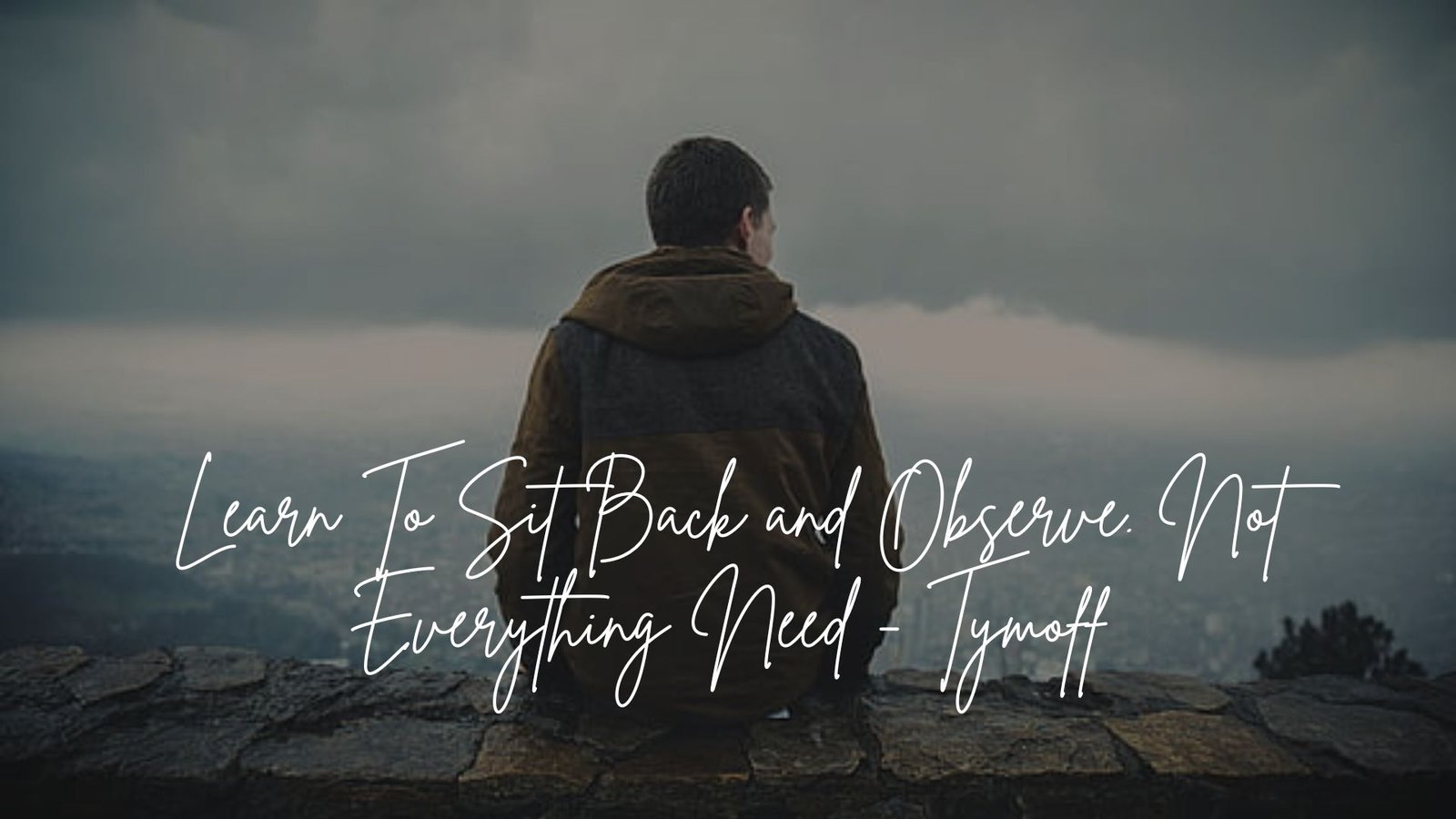Learn To Sit Back and Observe. Not Everything Need – Tymoff
In today’s fast-paced world, we are constantly on the move. Whether it’s keeping up with social media, responding to work emails, or dealing with everyday responsibilities, the pressure to always be “doing something” can be overwhelming. Amid this hustle and bustle, it’s easy to forget the simple yet profound art of sitting back and observing. The idea that “not everything needs action” might sound counterintuitive in a world where productivity is king. However, taking a step back and observing the world around us can offer new insights, foster deeper understanding, and ultimately contribute to better decision-making in our lives.
The Essence of Sitting Back and Observing
In a society that values action and efficiency, there is often a misconception that if you’re not doing something, you’re wasting time. This misconception leads many people to over-schedule their days, fill their time with tasks, and continually seek external validation from constant activity. But the reality is that not everything requires immediate action or response. Sometimes, the most valuable thing we can do is simply sit back, observe, and wait for the right moment to act.
When you take the time to observe, you create space for reflection. You allow yourself the opportunity to process information, understand different perspectives, and make decisions based on more thoughtful deliberation. In other words, stepping back doesn’t mean inaction—it’s an active process of gathering insights, recognizing patterns, and preparing yourself for a more informed course of action.
Also Read: Meet Nala Cat: The Instagram Star with a Ton of Fo – Tymoff
The Benefits of Observing
The act of sitting back and observing may seem passive at first glance, but it is, in fact, an essential skill for personal growth and well-being. The following are some of the benefits that come from adopting this mindset:
1. Improved Decision-Making
When you take the time to observe situations rather than rushing to act, you gain a clearer understanding of the dynamics at play. Whether it’s in a personal relationship, at work, or in a social situation, observing allows you to better grasp the nuances and complexities of the scenario. This heightened awareness leads to more informed decisions that are well-thought-out and more likely to yield positive outcomes.
Rushed decisions are often made with incomplete information and can lead to regret or undesirable consequences. By learning to sit back and observe, you avoid hasty choices and give yourself the time you need to make decisions that truly align with your goals and values.
2. Enhanced Emotional Regulation
One of the greatest challenges we face in a high-stress world is managing our emotions effectively. When we are constantly reacting to events as they unfold, our emotions can sometimes cloud our judgment and lead to rash actions. By learning to sit back and observe, you can better regulate your emotional responses.
Observing before reacting allows you to detach from the immediate emotional surge and provides you with the opportunity to respond in a calm, measured way. Whether it’s a disagreement with a colleague or a stressful situation at home, stepping back to observe helps you regain control over your emotions and act with greater composure.
3. Increased Mindfulness and Presence
Mindfulness—the practice of staying present and fully engaged in the moment—is a skill that has gained significant attention in recent years due to its many mental and physical health benefits. However, it’s not always easy to be mindful, especially when we feel the pressure to constantly act and achieve.
When you learn to sit back and observe, you naturally become more attuned to the present moment. You start to notice things that you may have missed in the past—whether it’s the sound of birds chirping, the feel of the breeze on your face, or the subtle changes in someone’s behavior. By observing, you cultivate a sense of presence that enhances your overall well-being.
4. Strengthened Relationships
In relationships, whether personal or professional, listening and observing are often more important than speaking or taking action. When you sit back and observe others, you gain insight into their feelings, motivations, and needs. This allows you to respond more empathetically, creating stronger connections and fostering mutual respect.
Instead of jumping into conversations with solutions or advice, taking the time to observe and listen shows others that you value their perspective. In many cases, people simply want to feel heard and understood, and by observing without immediately offering a response, you create an environment of trust and open communication.
5. Greater Creativity and Problem-Solving
The world’s most innovative thinkers often credit their success to periods of deep observation and reflection. By sitting back and observing, you allow your mind to wander and connect dots that might not be immediately apparent. This process can unlock new ideas, creative solutions, and unique approaches to challenges.
When we’re constantly caught up in the rush to “do” and “achieve,” our ability to think outside the box can become stifled. By taking a step back, you give yourself the mental space needed for creative breakthroughs.
Why “Not Everything Needs Action”
In the constant cycle of action, it’s easy to forget that not every situation requires a response. The idea that “not everything needs action” is rooted in the wisdom of patience and discernment.
1. The Dangers of Overreacting
In many cases, people rush to act out of a fear of missing out or an ingrained sense of urgency. The need to respond immediately can often lead to overreaction, where actions are taken based on impulse or emotional triggers. These hasty actions might not be well thought out and can lead to unintended consequences.
Taking a step back allows you to assess the situation objectively. It gives you the space to process your emotions and think critically about the best course of action. This deliberate approach helps you avoid the pitfalls of overreacting and ensures that your actions are more effective and aligned with your long-term goals.
2. Embracing Uncertainty
The world is unpredictable, and not everything can or should be controlled. When we try to act on every impulse or situation, we may become consumed by the desire to manage outcomes. However, not every moment requires a response or intervention. Sometimes, the best thing you can do is embrace the uncertainty and allow things to unfold naturally.
This doesn’t mean being passive or complacent; it means recognizing that not everything is within our control. Learning to accept this uncertainty and observing rather than acting gives us the ability to flow with life’s changes rather than resist them.
3. The Power of Observation in Leadership
For leaders, the ability to observe before taking action is a critical skill. Leadership is not just about making decisions or giving orders—it’s about understanding the needs of your team, recognizing opportunities for growth, and identifying potential challenges before they arise.
Leaders who are able to sit back and observe are often better at reading people, understanding the dynamics of a situation, and knowing when to step in and when to let others take the lead. By cultivating this skill, leaders can build stronger, more cohesive teams and create an environment where everyone feels empowered to contribute.
Also Read: How I Sleep at Night Knowing l’m Failing All My Cl – Tymoff
Practicing the Art of Observation
Learning to sit back and observe is a skill that requires practice. Here are a few tips for cultivating this ability:
1. Create Space for Reflection
Set aside time each day for quiet reflection. Whether it’s a few minutes of meditation, a walk in nature, or simply sitting in a quiet room, giving yourself time to reflect allows you to observe your thoughts, emotions, and surroundings.
2. Mindfully Observe Your Environment
Take a moment each day to notice what’s happening around you. Observe the people you interact with, the dynamics of your workplace, or the natural world. Pay attention to details you might normally overlook.
3. Develop Active Listening Skills
Listening is a key component of observation. When you’re in a conversation, focus on truly hearing the other person rather than thinking about what you’re going to say next. This allows you to better understand their perspective and respond thoughtfully.
4. Practice Patience
The art of observation requires patience. Resist the urge to act immediately and instead give yourself the time to fully process what you’re experiencing. Trust that the right action will present itself when the time is right.
Conclusion
In conclusion, learning to sit back and observe is an invaluable skill that can enhance various aspects of our lives. By embracing this approach, we open ourselves to greater self-awareness, improved decision-making, and stronger relationships. While the world may constantly push us to do more and achieve more, it is equally important to recognize that not everything needs immediate action. Sometimes, the most powerful thing we can do is step back, observe, and let things unfold in their own time.









Post Comment